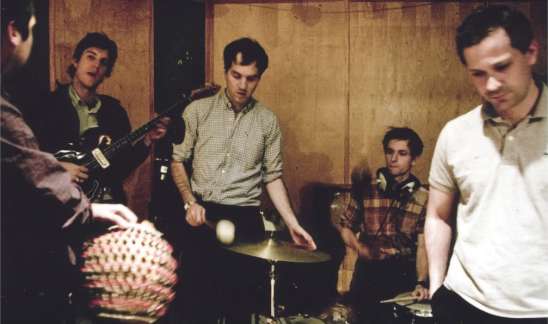
Coming off their infectiously energetic debut LP, Post-Nothing, Vancouver rock-revitalizers Japandroids aim to continue their frenetic take on punk anthem-building with their anxiously-awaited followup record, Celebration Rock. Is this the aptly titled opus that will push the two-man act past their noisy, angst-y cradle, or a sophomore misstep that keeps the boys in song-writing safe-zones.

You have no idea how right this picture is.
Let me get this out of the way (before my preface has me playing the part of critical waffler): part of Japandroids’ undeniable charm, as evidenced on their fantastic 2009 debut, Post-Nothing, is their heart-wrenching appreciation for simplistic and yet brutally energetic anthem howling. Did it matter that the majority of their first LP’s songs were predominantly composed of two or three lyrical lines shouted out over guitar-blasts and a sea of cymbal crashes? Not really: the album was so enticingly rapturous, it was hard not to smile or sing along or make it a permanent iPod fixture (guilty on all accounts). It also helped that these Canadian dudes put on a hell of a live show, complete with heavy duty fans to blow Brian King’s hair around. It was definitely the most fun I’ve ever had a small venue show, and probably any show I’ve ever been to. So yeah, I’m impartial to these guys, but that impartiality is warranted by the undisputed air of grandiosity and genuine passion Japandroids pump into every two-minute explosion of noise-pop genius they pump out.
Now that the disclaimer’s out of the way, we can approach the topic at hand: Celebration Rock. The band’s second LP has been self-described as a significant maturation marker on King and drummer, David Prowse’s, songwriting skill-sets, particularly in the lyrical department. We’ve actually seen evidence of this popping up over the past few years anyways, as the eponymous track on the Younger Us 7″ delivered some of the most poignant punk-rock lyrics this side of the apolitical sphere since the mid-80’s. When King wails “Remeber that night you were already in bed/said ‘fuck it’, got up to drink with me instead”, what’s amazing is that you do: between the sonic assault and King’s engagingly familiar voice crying out for raucous abandon, the collective experience of being a twenty-something cascades over that four-second musical peak and suddenly everything is relative. Deep, I know…
But all existential yahoo-ism aside, Japandroids are one of those rare acts that truly manage to pack a decade’s worth of life-experience into three minute rock songs, a skill they aim to utilize for the full 35 minutes of Celebration Rock. Where Post-Nothing was an album built as much on dynamism as it was on beat-to-sh!t drums and hammered guitar riffs, Celebration takes Japandroids down a decided path to full-frontal sonic assault. From the time that familiar blast of distortion kicks-in about a minute into “The Nights of Wine and Roses”, the band maintains a breakneck pace and volume all the way to the exuberant (and appropriately titled) finish of “Continuous Thunder”. And, unlike similarly energetic moments on Post-Nothing, here each headbanging piece feels fully crafted: the lyrics are exponentially more literate across the board (“The House that Heaven Built”), Prowse tightens up his game, and King mercifully spares us from another “Crazy/Forever”. The results are decidedly poppier, but in a good way: Japandroids were always at their best live when a crowd could bounce around, crying out lyrics with King at the mic like a club-bound echo. It’s the kind of record that plays like a bar-scene performance where you buy the boys a round of Jameson for the times and sweat and tinnitus.
So, while Japandroids haven’t taken drastic steps away from their debut’s relentless rock n’ roll rampart, they have managed to hone their craft in a way that evolves previously unrefined facets (lyrics, musicianship) into sharpened sword-points of fuzz-blasted bliss. Enormously rewarding, energetic, and talent affirming, Celebration Rock offers a musical rarity these days: the feel-good record that won’t find its way into a Glee episode (if there is a god, thank him). So do yourselves a favor: go out, find the record, put $10 on the counter and the LP on whatever you have to play it with, and crank the volume to max. You’ll appreciate it later.
Crack Tracks (courtesy of Soundcloud):
“The House That Heaven Built” (Celebration Rock, Polyvinyl [2012])






















